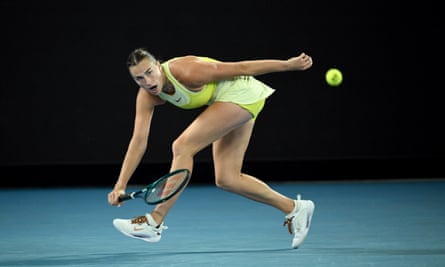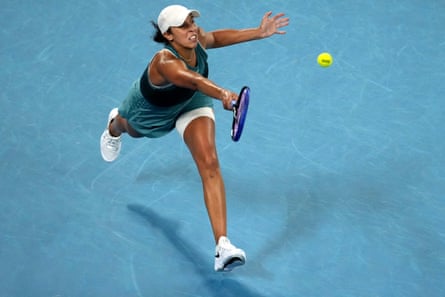After years of struggling with the suffocating expectations of her youth and wondering whether her biggest opportunities had passed her by, Madison Keys stood at the baseline inside a deafening Rod Laver Arena one game away from her ultimate goal. In the final stages of a phenomenal final between two of the most devastating ball-strikers in the game, all she could do was continue to attack.
While Keys might have succumbed to the pressure in previous years, this time the significance of the occasion inspired her most fearless, uncompromising shotmaking as she closed out a sublime performance with a 6-3, 2-6, 7-5 win over Aryna Sabalenka, the world No 1, to clinch her first grand slam title at the Australian Open.
Now 29 years old, Keys is the oldest first-time women’s Australian Open champion in the Open era. She has achieved it in her 46th grand slam appearance, the second highest count for a first-time champion. Two days after closing out another classic thriller against Iga Swiatek, the world No 2, Keys is the first player to defeat both of the top two at a grand slam since Svetlana Kuznetsova won the 2009 French Open.
“I’m just really proud of myself,” said Keys. “I didn’t always believe that I could get back to this point. But to be able to do it and win, it means the world to me.”
This victory was 16 years in the making. Once considered a child prodigy, Keys became one of the youngest players to win a WTA match at 14. From her early teens, she was constantly told she could win grand slam titles. At times, the pressure to live up to her talent was overwhelming. In order to move forward, she first had to take a step back and come to terms with the reality that winning a grand slam title might not happen.

“I finally got to the point where I was OK if it didn’t happen,” said Keys. “I didn’t need it to feel like I had a good career or that I deserved to be talked about as a great tennis player. I feel like finally letting go of that kind of internal talk that I had just gave me the ability to actually go out and play some really good tennis to actually win a grand slam.”
Keys has also finally found redemption for her first grand slam final at the 2017 US Open, where she failed to handle the pressure of the occasion and was crushed 6-3, 6-0 by her friend Sloane Stephens. “It was never if, just when,” wrote Stephens on X. “You deserve this and beyond.”
She closed it all out with an incredible performance. Determined to play the match on her own terms, Keys continued to attack and trust her ball-striking ability in all of the most important moments. While Sabalenka is used to dictating the rallies in almost all of her matches, the easy, destructive power Keys generates off both groundstrokes is second to none. In the decisive moments, Sabalenka was completely overpowered.
“If she can play consistently like that, I mean, there’s not much you can do,” said Sabalenka. “Of course, I know how to play against her, but in this match I couldn’t really do my stuff. She just played incredible. It seemed like she was overhitting everything. The depths of the balls were really crazy. I was trying my best. Obviously didn’t work well.”
The opening stages of Sabalenka’s third Australian Open final underlined how tough these occasions can be. She was clearly nervous as she double faulted twice in her opening service game, which she lost. While Sabalenka struggled, Keys burst into the match with confidence and belief, serving brilliantly and pounding forehands as she eased through the opening set. With her Australian Open hanging in the balance, Sabalenka improved her serving and began to pressure Keys’ second serve as fought back in the second set.
As she has re-established herself as the No 1 player over the past year, Sabalenka has fought her way through so many significant three set matches. Once again, Sabalenka rose to the occasion and produced some quality shotmaking throughout the set, but Keys showed her resilience by refusing to go away.
After finding big first serves in important moments to survive her difficult early service games, Keys grew in confidence throughout the set, winners flying off her racket behind dominant serving and relentless aggression.

“I almost felt like I was trying to beat her to it,” said Keys. “If I wasn’t going to go for it, I knew she was going to. It really kind of just pushed me to kind of thread the needle a little bit more. I just kept telling myself: ‘Be brave, go for it, just kind of lay it all out on the line.’ At that point, no matter what happens, if I do that, then I can be proud of myself.”
By the middle of the third set, the two players had brought the best out of each other as they combined for an incredible stretch of fearless, first-strike tennis. But Keys kept on holding serve and remained marginally ahead throughout the set.
After a supreme hold for 6-5, recovering from 15-30 with an array of winners, Keys tackled the most important return game of her life without hesitation, swinging for the fences until the match was over and a grand slam trophy was finally hers.


Post a Comment